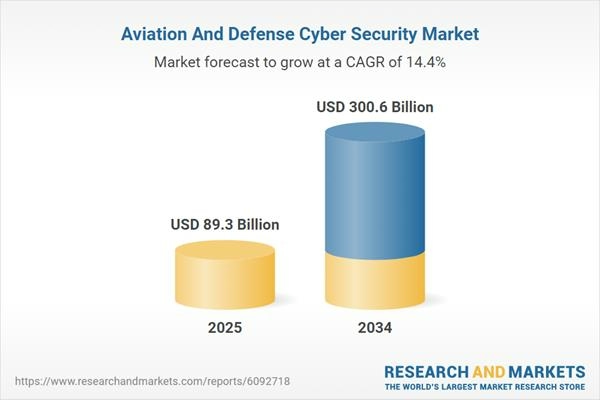AeroGenie — Ihr intelligenter Copilot.
Trends
Categories
Aviation and Defense Cybersecurity: Trends and Challenges Through 2034

Aviation and Defense Cybersecurity: Trends and Challenges Through 2034
The global aviation and defense cybersecurity market is poised for significant growth, with projections indicating an increase from $89.3 billion in 2025 to $300.6 billion by 2034. This expansion, reflecting a compound annual growth rate (CAGR) of 14.4%, is driven by a convergence of escalating cyber threats, rapid technological advancements, and rising global defense expenditures.
As the aviation and defense industries deepen their reliance on digital systems, interconnected technologies, and integrated networks, the imperative to protect sensitive data and critical operational assets has intensified. Cyberattacks targeting aerospace and defense infrastructure have grown increasingly sophisticated, propelled by geopolitical tensions, state-sponsored cyber warfare, and the widespread adoption of Internet of Things (IoT) devices within these sectors.
Key Trends and Innovations
In recent years, government agencies and leading aerospace corporations have significantly strengthened their cybersecurity measures. The year 2024 witnessed broader adoption of next-generation technologies, including artificial intelligence-driven threat detection, advanced encryption methods, blockchain applications, and zero-trust security architectures. Collaborative efforts between cybersecurity firms and aerospace manufacturers have further bolstered defenses against an evolving array of cyber threats.
Regulatory authorities, particularly in Europe and North America, have introduced stringent cybersecurity frameworks that mandate rigorous compliance standards. These regulations have compelled organizations to invest heavily in advanced security infrastructure, thereby fueling further market expansion.
Challenges Ahead
Looking forward to 2034, the aviation and defense cybersecurity landscape faces several formidable challenges. The increasing complexity and sophistication of cyberattacks now extend beyond traditional IT systems to encompass operational technologies and autonomous platforms. The ongoing digitalization of aviation, the integration of autonomous defense systems, and the proliferation of unmanned aerial vehicles (UAVs) have expanded the attack surface, complicating efforts to maintain comprehensive security.
Moreover, the evolving regulatory environment demands that organizations rapidly adapt to new cybersecurity mandates, often necessitating substantial investments in both technology and skilled personnel. Navigating this dynamic landscape will require continuous vigilance and agility.
Market and Industry Response
In response to these challenges, the cybersecurity services segment within aviation and defense is expected to attract heightened investment, with a projected CAGR of 6.1% from 2025 to 2034. Industry players are anticipated to pursue mergers and acquisitions to enhance technological capabilities and increase market share. The development of advanced cybersecurity solutions will be essential for companies seeking to maintain a competitive edge amid a rapidly shifting threat environment.
Enhanced governmental funding and strategic partnerships focused on cybersecurity research and innovation are also expected to generate significant opportunities for market participants. As digital transformation accelerates and cyber threats evolve, robust cybersecurity will remain a critical priority for the aviation and defense sectors worldwide.

Capital A Completes Sale of Aviation Business to AirAsia X

Four Gateway Towns to Lake Clark National Park

PRM Assist Secures €500,000 in Funding

Should Travelers Pay More for Human Support When Plans Go Wrong?

InterGlobe Aviation Shares Rise 4.3% Following January Portfolio Rebalancing

Key Market Segments Shaping Airline Route Profitability Software

Locatory.com Gains Traction Among Aviation MROs and Suppliers

JetBlue Flight Makes Emergency Landing Following Engine Failure

58 Pilots Graduate from Ethiopian University

The Engine Behind Boeing’s Latest Widebody Aircraft
